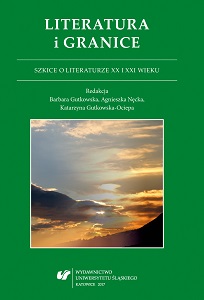„Jeżeli jeszcze miała coś swojego, było to jej ciało – jedyne, co mają zwierzęta”. O Nocnych zwierzętach Patrycji Pustkowiak
„Jeżeli jeszcze miała coś swojego, było to jej ciało – jedyne, co mają zwierzęta”. On Nocne Zwierzęta by Patrycja Pustkowiak
Author(s): Emilia Wilk
Subject(s): Language and Literature Studies
Published by: Wydawnictwo Uniwersytetu Śląskiego
Summary/Abstract: The aim of the article has been to present Tamara Mortus – the protagonist of Nocne Zwierzęta by Patrycja Pustkowiak – who exhibits autodestructive behaviour, struggles with addiction to psychoactive substances and with animalism manifesting itself in the lack of possibility to fix a boundary between what is human and what is feral. In consequence, Tamara represents a type of person who is excluded from society, called homo sacer, devoid of human values, therefore a human-reject. Probably, in Nocne Zwierzęta, the boundary between the human and the feral is overstepped due to the fact that –just like an animal – Tamara was able to pounce on her prey and kill it, but –like a human being – loses herself in melancholic reclaimings, unceasingly experiencing loss (from the most earthbound things to existential values, which in general cultural opinion are elusive). Moreover, in Tamara’s life, a non-trivial role is played by the feeling of unremitting emptiness connected mainly with her alcoholism, and also by very strongly exposed corporeality, as well as the impossibility of finding herself in the contemporary consumptive world. All the above-mentioned factors make us think of Tamara as of an empty and worthless woman, or, to put it colloquially, a “blown egg”.
Book: Literatura i granice. Szkice o literaturze XX i XXI wieku.
- Page Range: 199-226
- Page Count: 28
- Publication Year: 2017
- Language: Polish
- Content File-PDF

